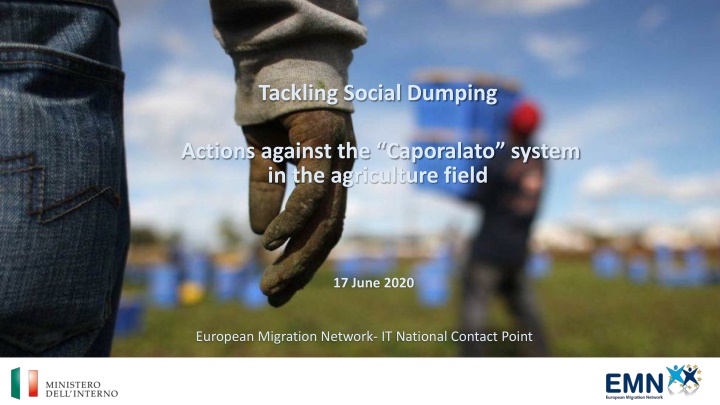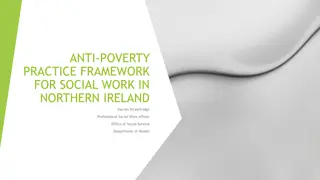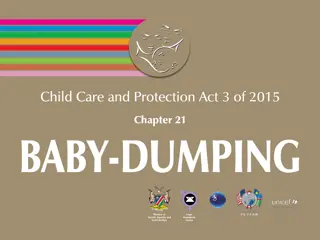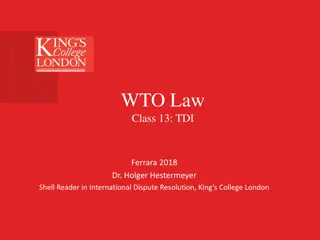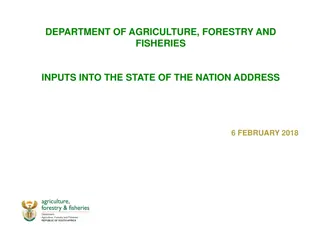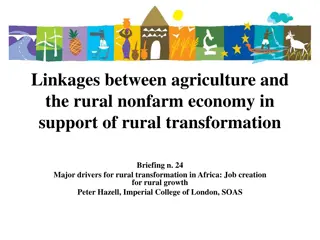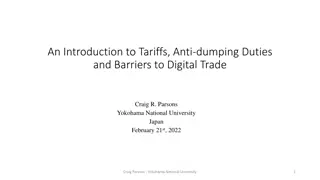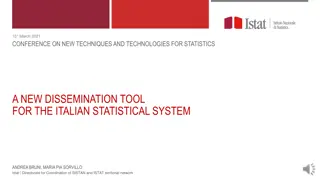Tackling Social Dumping in Italian Agriculture: Fighting the Caporalato System
Social dumping in Italy's agricultural sector is exemplified by the Caporalato system, where workers are exploited through sub-standard pay and conditions. Gangmasters are criminal recruiters who profit from controlling vulnerable workers. This article delves into the prevalence and impact of social dumping, highlighting the need for action to protect the rights of agricultural workers in Italy.
Download Presentation

Please find below an Image/Link to download the presentation.
The content on the website is provided AS IS for your information and personal use only. It may not be sold, licensed, or shared on other websites without obtaining consent from the author.If you encounter any issues during the download, it is possible that the publisher has removed the file from their server.
You are allowed to download the files provided on this website for personal or commercial use, subject to the condition that they are used lawfully. All files are the property of their respective owners.
The content on the website is provided AS IS for your information and personal use only. It may not be sold, licensed, or shared on other websites without obtaining consent from the author.
E N D
Presentation Transcript
Tackling Social Dumping Actions against the Caporalato system in the agriculture field 17 June 2020 European Migration Network- IT National Contact Point
Agenda 1 6 The Technical Commission Introduction 7 2 The Action Plan The primary sector in Italy 8 3 The Covid-19 pandemic response The main features of gangmasters 4 How it works 5 The legislative framework
Introduction Social dumping takes different forms in different sectors, but it is clear that it is a strategy based on unfair market competition and aimed at maximize profits. It is used and accepted by States, by companies and sometimes by workers. When it comes to undeclared work it becomes also criminal In Italy, the illegal form of workers recruitment and exploitation is called Caporalato , translated in English as gangmasters system. The EMN Glossary on migration defines Social dumping as the practice whereby given pay and conditions which are sub-standard compared to those specified by law or collective agreements . workers /or are working Gangmasters are criminal recruiters who control and exploit workers. This criminal system (transport, construction, logistics and care services), but it is particularly strong in the agricultural field, characterised by a prevalence of short-term and seasonal jobs. involves various sectors
Some numbers about the primary sector in Italy Trentino Alto Adige Friuli Venezia Giulia 1,125,000 agricultural workers Aosta Valley Lombardy Veneto Piedmont Emilia Romagna Liguria Tuscany 405,000 foreign workers (both regular and irregular) Marche Umbria Abruzzo Lazio Molise Puglia 39% is the estimated rate of irregularity Campania Sardinia Basilicata Calabria 132,000 workers are in a state of serious social vulnerability Sicily
The main features of gangmasters 1 The mediation between supply and demand in a given geographical area, and in a specific sector. It focuses on the weaker targets: vulnerable people, in particular migrants. 2 3 The monopoly of the transport system, which forces workers to pay to get to and from workplaces.
How it works The gangmaster manages illegally all labour requirements, duties, transportation of workers to workplaces. The consequent tax and contribution evasion and in violation of labour standards and requirements. work performed is often irregular with salaries and Workers are employed for 8-12 hours per day with no protection or rights. They pay for transportation and all basic needs to gangmasters. The result is the systematic violation of the most basic human, social and economic rights. It is not uncommon the use of physical violence. The gangmaster is part of a structured criminal organisation with a strict division of roles and responsibilities. In investigations to fight the gangmaster system. 2019, the military police conducted 263
Evolution of the legislative framework 1949 Introduction of fines for illegal intermediation. The Italian Immigration Law punishes with imprisonment from 6 months to 3 years and a fine of 5,000 euros for each worker, the employer who "employs" foreigners without residence permits. 1998 The offence of Illegal intermediation and labour exploitation (Art. 603 bis Penal Code) was introduced into the Penal Code (Leg. Decree no. 138/2011). 2011 2012 The Implementation of the Employers Sanctions Directive 2009/52/EC provided specific sanctions and measures against employers of irregular migrants. 2016 Law 119/2016 was approved, specifically aimed at fighting undeclared work and exploitation in agriculture. The law further introduced new forms of support for seasonal workers in agriculture. 2018 Set up of the Technical Commission for the definition of a new strategy for countering gangmasters and labour exploitation in agriculture. 2020 Decree-Law n. 34 adopted in response to the Covid-19 pandemic to ensure adequate health protection and to encourage the emergence of irregular employment.
Technical Commission against exploitation and the gamgmaster (s.c. Tavolo Caporalato) In 2018, the Technical Commission for the definition of a new strategy for countering gangmasters and labour exploitation in agriculture was set up (Leg. Decree 119/2018). Chair Ministry of Labour and Social Policies National Labour Inspectorate Military & Tax Police Ministry of Infrastructure & Transport Ministry of Justice Ministry of Agriculture Ministry of the Interior INPS ANCI ANPAL
The Action Plan On February 20, 2020, the Technical Commission adopted an Action Plan against Caporalato . The Plan (2020-2022) develops the national strategy to combat gangmasters and labour exploitation in agriculture around four priority axes: ACTION PLAN CHALLENGES Surveillance and repression of the gangmaster phenomenon 1 1 2 Price adjustment of agricultural products 2 Prevention Oversight 3 Intermediation between demand and supply AXES Working Groups 4 Transportation and accommodation Reintegration Protection Development of quality in the labour network 5 4 3 6 Enhancement of the Employment Centers' role
Covid-19 pandemic response On May 19, 2020, the Italian Government adopted Decree-Law n. 34 to ensure adequate health protection in response of the Covid-19 pandemic and to encourage the emergence of irregular employment. MAIN PROVISIONS SECTORS Employers (nationals, EU citizens or EU long-term residence holders) can apply to sign a job contract with irregular foreign citizens or declare an irregular employment relationship. Agriculture, livestock and animal husbandry, fisheries and aquaculture and related activities Foreign citizens, with a residence permit expired as of October 31, 2019, who can demonstrated have worked in the sectors foreseen, may apply for a temporary residence permit of 6 months, valid only in Italy, in order to find a job. Assistance to people or family members suffering from pathologies or handicaps Domestic work to support family needs Applications may be submitted from 1 June to 15 July 2020. The Decree will contribute to tackle the gangmasters system. It will assist the agricultural sector affected by seasonal labour shortage due to travel restriction, and will reduce the stock of irregular migrants in Italy.
Relevant data on caporalato FOURTH REPORT ON AGRO-MAFIAS AND GANGMASTERS 2018 Placido Rizzotto Flai Cgil Observatory Page 12
Relevant data on Caporalato (1/6) Economic crime and illegal economy The main activities of agromafia Economy not observed in Italy: 208 billion euro Trafficking in human being for the porpouse of serious exploitation Irregular employment is worth 77 billion euro (37,3%) Illegal labour intermediation Import/export of agri-food products Irregular employment (37,3%) Fraud against EU Economy not observed Wholesale and retail supply exposure 63% Recycling and extorsion Infiltration in the management of fruit and vegetable markets 15,5% Incidence of the agricultural sector s irregular employment on the added value of the agricultural sector Infiltration in the logistics and business service sector 4,8 billions Irregular employment and caporalato bus iness in agricolture Poaching Infiltration in renewable energy sector linked to agricultural activities 1,8 billions Only for tax evasion
Relevant data on Caporalato (2/6) 1 billion euro The main product sectors at risk the value of seized counterfeit food products from 2012 to 2016 Slaughtering Fruit&Vegetable Milk products 33 millionKg Of food products and 60 million litres of liquid products (in particular oil, milk and wine) Fishing Wine Bak ery The Financial Police has estimated has estimated the loss of tax due to counterfeiting in 5,7 billion euros and about 100,000 regular jobs lost. ltaliansounding 60billion euros is the value of agri-food products sold abroad Plants products for industrial processing
Relevant data on Caporalato (3/6) Irregular employment and 39% 400.000/430.000 caporalato Agricultural workers exposed to the risk of irregular and under caporalato recruitment Irregularity rate of labour relations in agriculture More than 300.000agricultural workers work for less than 50 days a year (almost 30%of the total) Presumablythereisalotofirregularworkinthisbasin More tha 132.000 Are in a state of serious social vulnerability and severe occupational distress 7265 Companies audited by the Labour Inspectorate Inspections & control 360 company suspension procedures 87% of them revoked after regularisation activities (2017) More than 50% 284people referred to judicial authorities of which 71 under arrest for the crime of working and caporalato exploitation Companies audited presenting irregularities 12irregular workers identified The number of marks made by the Labour Inspectorate rose from 9 (in 2016) to 94 (in 2017) 3549 undocumented workers, almost 67% with 387 victims of caporalato exploitation recorded
Relevant data on Caporalato (4/6) Territorial distribution of arrests and denouncements for Caporalato crime
Relevant data on Caporalato (5/6) Conditions of workers subjected to serious exploitation in agriculture 220 agricultural districts, 500/700 In agricultural workers are irregularly recruited and employed in indecent conditions with manifest peaks of para-slavery subjugation. on average No protection and rights guaranteed by contract and law According to estimates, in districts there are about 34 gangmasters, about 102 per province and about 15.000 throughout the national territory. Avaragepaybetween20-30 per day Avarage working hours from 8 to 12 hours per day Each province is characterized by the presence of 3/4 agricultural sub- areas, where on average there are gangmasters with different social profiles: on average 21 team leaders, 10 managerial leaders, 2 colluded with the criminal organizations and 1 organic team with a mafia gang. Piecework for a fee of 3/4 for a 75Kg Approximately 50% lower salary than the national collective bargaining agreements Paying the transport to the gangmaster depending on the distance, on avarage 5 euros Women receive a salary 20% lower than theit collegues Payingforbasicnecessities (on avarage1,5 l, 3 for sandwich,etc) In serious case of exploitation, some migrants workers received a salary of 1 per hour
Relevant data on Caporalato (6/6) Migrant workers 28% Agricultureand migrant work Out of about one million agricultural workers, migrants remain a fundamental resource: 2017: 286.940migrants workers of which: 151,706 from the EU (53%) and 135,234 from non-EU countries (47%). To these data must be added the estimates on undeclared work: 405,000 Foreign workers in agriculture (between regular and irregular) of which 16.5% have an informal employment relationship (67,000 units) and 38.7% a non-union salary (157,000 units
Resources https://www.europarl.europa.eu/RegData/etudes/BRIE/2017/599353/EPRS_BRI(2017)599353_EN.pdf https://www.eurofound.europa.eu/observatories/eurwork/industrial-relations-dictionary/social- dumping#:~:text=Social%20dumping%20is%20a%20hotly,at%20the%20exploitation%20of%20workers.&text=Andr%C3%A9 %20Sapir%20(2015)%20uses%20the,countries%20with%20lower%20social%20conditions . https://www.europarl.europa.eu/RegData/etudes/BRIE/2017/599353/EPRS_BRI(2017)599353_EN.pdf https://www.lavoro.gov.it/priorita/Documents/Piano-Triennale-contrasto-a-sfruttamento-lavorativo-in-agricoltura-e- al-caporalato-2020-2022.pdf https://www.flai.it/osservatoriopr/il-rapporto/
Resources https://www.crea.gov.it/-/immigrati-in-agricoltura-3-studi-crea-politiche-e- bioeconomia?inheritRedirect=true&redirect=%2Fweb%2Fagricoltura-e-ambiente%2Fsearch%3Fq%3Dcaporalato file:///C:/Users/stefa/Downloads/4RAPP_scheda_sintesi_ENG.pdf https://temi.camera.it/leg17/post/OCD25-272.html?tema=temi/nuovi_reati_d http://www.integrazionemigranti.gov.it/Attualita/Notizie/Documents/DECRETO%20LEGISLATIVO%2016%20luglio%202012. pdf
Questions & answers from the webinar 1. Do you have data on how many irregular migrants have filed a complaint to the competent authorities and been able to successfully get a residence permit as a result (not apply but actually receive the permit)? In line with Article 18 of the Consolidated Text on Immigration (Law n. 286/1998), a foreigner who is in a situation of violence or serious exploitation can obtain a residence permit for reasons of social protection". Such a permit is issued by the Police Authority (i.e. the Questore) if there is a concrete danger for the safety of the foreigner, enabling him/her to participate in a program of assistance and social integration. Moreover, according to article 22, paragraph 12-quater, in case of particular labour exploitation, a residence permit is issued by the Police Authority, upon proposal or with the favourable opinion of the Public Prosecutor, to the foreigner who has filed a complaint and cooperates in the criminal proceedings against the employer. In terms of data, the updated number of irregular migrants who have filed a complaint to the competent authorities and been able to successfully get a residence permit is not available. 2. In the case that the irregular migrant has not received their wages by their employer are they able to get their unpaid wages once they file a complaint? Yes, the irregular migrant who works without receiving a salary may take a legal action to request the recognition of the work relationship and the actual payment of the amounts due.
